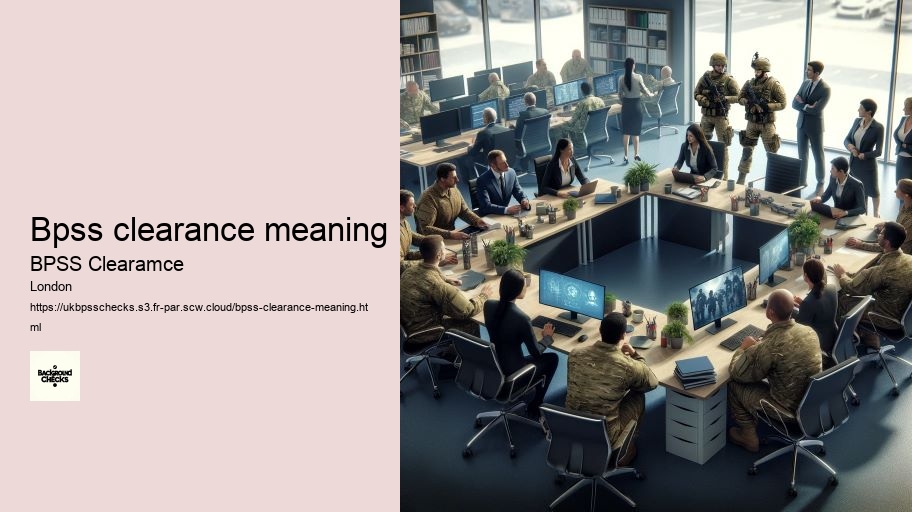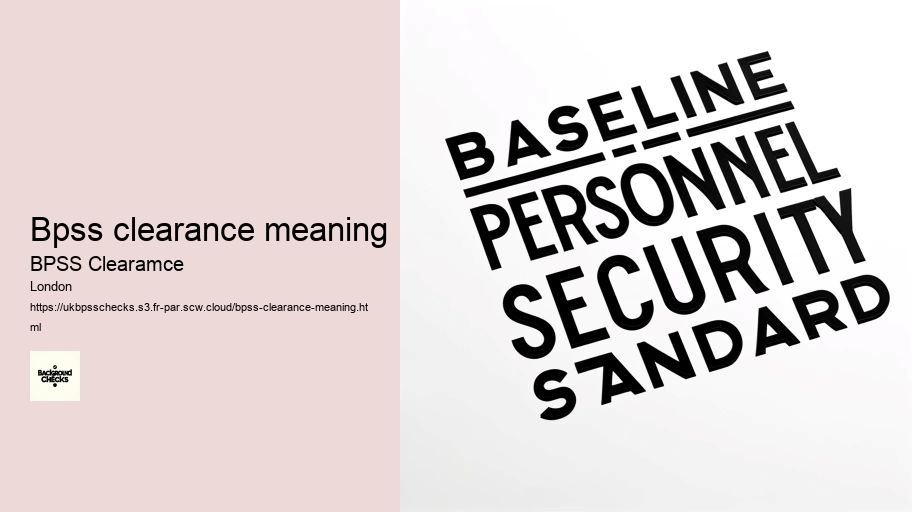
- Providing reasons for extended stays abroad can help clarify your activities during that time.
The role of BPSS clearance in maintaining public trust cannot be overstated. By ensuring that individuals
BPSS clearance is often a prerequisite for obtaining higher levels of security clearance, such as Security Check (SC) or Developed Vetting (DV). Completing BPSS successfully indicates that an individual has met the baseline requirements for trustworthiness and reliability, which are essential for more in-depth investigations.
Employers must also ensure transparency in the BPSS process. This involves informing candidates that a BPSS check will be conducted, what the check entails, and what specific information will be gathered.
Employment history checks are another key component of BPSS clearance, providing insight into an individual's work behavior and integrity. These checks help verify the accuracy of the information provided by the applicant and uncover any discrepancies or gaps in employment that might need further investigation. This step is crucial in building a comprehensive profile of the candidate's past professional conduct.
When comparing BPSS checks to other screening processes, it becomes evident that BPSS focuses specifically on verifying identity, right to work status, criminal records, and employment history.

Baseline Personnel Security Standard (BPSS) and Disclosure and Barring Service (DBS) checks are two distinct types of background checks used in the United Kingdom, each serving specific purposes. While BPSS checks are used primarily as a pre-employment screening tool for government-related positions, DBS checks are broader and focus on determining an individual's suitability to work with vulnerable groups including children and adults.
As part of BPSS clearance, a basic criminal record check is conducted. This is generally quicker than more detailed checks, such as those performed for higher levels of security clearance, but can still be delayed if there are issues with the national criminal records database or if the individual has spent significant time overseas.
Cloud technology plays a pivotal role in the BPSS process by providing a centralized platform for storing and accessing data across different locations and devices securely.
Members of the UK armed forces, civil servants, and government contractors typically require BPSS clearance for accessing government assets. Temporary staff within government organizations may also need a BPSS check as part of pre-employment screening procedures.
Can You Fail a Bpss? Yes, you can fail a BPSS check if there are discrepancies in your identity verification, right to work status, criminal records, or employment history. It's essential to provide accurate information and meet the trustworthiness standards to pass the screening process. Failing to do so can result in not meeting the required eligibility criteria for accessing sensitive information and working in secure environments. Be honest and consistent to avoid failing the BPSS check.


The individual's personal circumstances can also impact the time it takes to complete a BPSS check. For example, individuals who have frequently moved or changed jobs may require more extensive checks on their background, thus extending the process.
The process of conducting BPSS checks is systematic and standardized to ensure consistency and thoroughness. Employers or vetting agencies collect the necessary documents and information from the candidate, which are then meticulously verified against various databases and through direct contact with relevant institutions.
Therefore, full disclosure and honesty regarding any unspent criminal records are crucial steps in the BPSS application process.
Employment history verification is a critical part of the BPSS check and can extend its duration. This process involves reaching out to past employers to confirm periods of employment, roles held, and reasons for leaving, which can take time if past employers are slow to respond or if the candidate has worked internationally.
The incorporation of digital technologies in BPSS has allowed for the integration of biometric verification processes such as fingerprinting and facial recognition. These technologies provide an additional layer of security by ensuring that the identity information provided by the applicant matches biometric data, further securing sensitive positions within government and related sectors.
The Data Protection Act (DPA) 2018, which incorporates the General Data Protection Regulation (GDPR) into UK law, is crucial in the administration of BPSS checks. The act mandates how personal data, including data collected during BPSS clearance, should be handled—ensuring it is processed lawfully, fairly, and transparently.

- Any connections or affiliations established overseas should be clearly communicated.
- Complete and submit all required documentation accurately and truthfully.
During the renewal process, you'll need to undergo re-verification of your right to work, identity, criminal records, and employment history to confirm continued eligibility. Failure to renew your BPSS clearance on time can lead to a lapse in access to sensitive information and government assets.
BPSS stands for "Baseline Personnel Security Standard." It's essentially a basic level of security clearance required for individuals working in roles that involve access to sensitive information or facilities, especially in the public sector. The BPSS checks typically include identity verification, employment history checks, and criminal record checks.
No, BPSS (Baseline Personnel Security Standard) and DBS (Disclosure and Barring Service) are not the same.
BPSS (Baseline Personnel Security Standard): This is a set of government guidelines in the United Kingdom for ensuring the security clearance of individuals working with sensitive information or in certain roles. It is a basic level of security clearance and involves checks such as identity verification, employment history, and criminal record checks. BPSS is often required for roles in both the public and private sectors where access to sensitive information or facilities is involved.
DBS (Disclosure and Barring Service): This is a government agency in the UK that performs checks on individuals working with children or vulnerable adults. The DBS conducts criminal record checks (previously known as CRB checks) to help organizations make safer recruitment decisions by identifying candidates who may be unsuitable for certain roles due to past criminal convictions, cautions, reprimands, or warnings.
While both BPSS and DBS involve background checks, they serve different purposes and are used in different contexts. BPSS focuses on security clearance for a broader range of roles, including those involving access to sensitive information, while DBS specifically focuses on roles involving work with vulnerable groups.
The Baseline Personnel Security Standard (BPSS) checks typically include:
Identity Verification: Verifying the identity of the individual through official documents such as passports, driver's licenses, or other government-issued identification.
Employment History Checks: Verifying the individual's employment history to ensure accuracy and assess their suitability for the role.
Criminal Record Checks: Checking for any criminal convictions or cautions. This is often done through a Basic Disclosure from the Disclosure and Barring Service (DBS) in England and Wales, Disclosure Scotland in Scotland, or AccessNI in Northern Ireland.
Verification of Address: Verifying the individual's current and previous addresses to ensure accuracy and completeness of their background information.
These checks are aimed at establishing a baseline level of trustworthiness and suitability for individuals working in roles that require access to sensitive information or facilities, particularly within the public sector but also in some private sector positions.
A valid proof of address for a Baseline Personnel Security Standard (BPSS) check typically includes official documents that clearly display the individual's name and current address. Common examples of acceptable proof of address documents may include:
Utility Bills: Recent bills for services such as electricity, gas, water, or landline phone, issued within the last three to six months.
Bank Statements: Recent bank statements, typically issued within the last three to six months, showing the individual's name and address.
Official Letters: Letters from government agencies, local authorities, or financial institutions, such as tax statements, council tax bills, or letters from the Department for Work and Pensions (DWP), which display the individual's name and address.
Tenancy Agreements: A signed and dated rental or lease agreement for accommodation, showing both the tenant's and landlord's details, along with the property address.
Mortgage Statements: Statements from a mortgage provider showing the individual's name and property address, issued within the last three to six months.
It's important to note that the specific requirements for proof of address may vary depending on the organization conducting the BPSS check. Additionally, the document should be recent and not expired, and it should clearly display both the individual's name and current address.
A Baseline Personnel Security Standard (BPSS) check is typically required for individuals working in roles that involve access to sensitive information or facilities, particularly within the public sector but also in some private sector positions. While specific requirements may vary depending on the organization and the nature of the role, BPSS checks are commonly needed for individuals who:
In summary, individuals who require a BPSS check are those whose roles involve a level of trust, responsibility, and access to information or facilities that necessitate verification of their identity, employment history, and suitability for the position.
The Baseline Personnel Security Standard (BPSS) does not have an expiry date like some other security clearances. Instead, it serves as a foundational level of security clearance that establishes an individual's baseline trustworthiness and suitability for roles requiring access to sensitive information or facilities.
However, while the BPSS itself does not expire, organizations may have their own policies regarding the periodic review or renewal of security clearances for their employees. For instance, some employers may require employees to undergo regular rechecks or refreshes of their background checks, including BPSS checks, to ensure that their security clearance remains up to date.
Therefore, although the BPSS clearance itself doesn't have a fixed duration, individuals and organizations should be aware of any policies or requirements related to maintaining and updating security clearances in accordance with best practices and organizational guidelines.